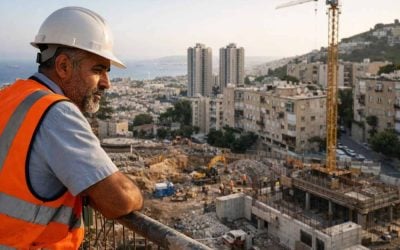Imagine taking a city known for its complex cultural tapestry and rapidly turning it into a model for growth and unity. Shmuel “Shmulik” Greenberg, the dynamic mayor of Beit Shemesh, is doing just that.
From Yeshiva Student to Visionary Leader
Born December 22, 1975, in the serene town of Rekhasim, Shmuel Greenberg is a product of a rich blend of religious and secular education. His journey began with traditional Torah studies at Tashbar Rekhasim elementary and Torat Emet Talmud Torah, later attending the renowned Kfar Hasidim yeshiva. He seamlessly transitioned to serving in Unit 995 of the Israel Defense Forces, cultivating discipline and leadership early on.
Greenberg’s impressive educational credentials include:
A Law Degree from Ono Academic College
A Master’s in Public Policy from Hebrew University of Jerusalem
A teaching certificate and mediation training
Graduation from the Mandel Institute’s prestigious management and leadership program
This extensive education positions him uniquely to bridge religious values with practical governance, earning him the reputation of being “educated, open-minded, and learned.”
Grassroots Leadership and Community Impact
Early in his career, Greenberg devoted a year to teaching in Panama, enhancing his global perspective. Back in Beit Shemesh, his experience in education provided firsthand insights into community needs, leading to his appointment in 2003 as head of Haredi Affairs in the city municipality.
A brief interruption of municipal roles pushed Greenberg into national politics as an assistant to MK Moshe Gafni of Degel HaTorah, sharpening his political acumen. Despite his national presence, Greenberg remained passionately involved locally, later overseeing youth initiatives and community centers, always blending Torah ethics with respectful civic engagement.
Decade of Transformational Municipal Leadership
In 2008, Greenberg officially entered local politics as Deputy Mayor under Mayor Moshe Abutbul, marking a decade (2008–2018) of significant municipal achievements:
Major infrastructure enhancements
Effective management of transportation, city services, and community development
Leadership of critical committees, notably in traffic and road safety
Integration of rapidly growing Haredi neighborhoods such as Ramat Beit Shemesh
Greenberg’s focus was clear: unify diverse communities and ensure practical city growth, successfully balancing traditional values and modernization.
Stepping into the Mayoral Spotlight
After a shift in political dynamics in 2018, Greenberg served briefly in Jerusalem, notably managing Haredi educational policies under Mayor Moshe Lion. His political influence continued to grow, particularly highlighting his expertise in education and transportation.
In mid-2023, Greenberg returned boldly to Beit Shemesh politics, running for mayor with unified backing from all Haredi factions. His campaign was inclusive, appealing broadly—including significant outreach to the English-speaking immigrant community.
Greenberg led the first round of elections in February 2024 and won decisively in the runoff against incumbent Mayor Dr. Aliza Bloch, securing 57.9% of the votes. His victory symbolized both unity among Haredi groups and broader community appeal.
Major Initiatives and Recent Milestones (2024–2025)
Since becoming mayor in March 2024, Greenberg has ambitiously pursued several transformative projects:
Expanding Beit Shemesh
Partnered with Israel’s Ministry of Housing for an unprecedented expansion to build 30,000 housing units, nearly doubling the city’s population to over 300,000.
Fast-tracked 3,500 housing units specifically in Ramat Beit Shemesh to address urgent housing needs.
Elevating Healthcare
Opened advanced operating rooms at Hadassah Beit Shemesh Hospital in October 2024, enabling critical medical procedures locally and significantly reducing residents’ need to travel.
Enhancing Community Safety and Cohesion
Swiftly condemned and addressed extremist behavior, collaborating closely with local rabbis and law enforcement to ensure harmony.
Proactively addressed public transportation, sanitation, and quality-of-life issues, directly benefiting day-to-day experiences for residents.
Shmuel Greenberg’s Unique Leadership Vision
Greenberg’s blend of deep-rooted religious values, advanced academic training, and practical governance makes him a unique leader in Israel’s political landscape. His innovative yet respectful approach has positioned Beit Shemesh as a city ready to thrive culturally, economically, and socially.
Too Long; Didn’t Read (TL;DR)
Shmuel Greenberg combines religious and secular education for balanced leadership.
Served 10 impactful years as deputy mayor, leading crucial city developments.
Elected mayor in 2024 with significant community and factional unity.
Launched ambitious city expansions and local healthcare enhancements.
Emphasizes unity, education, and practical municipal improvements.
Greenberg is reshaping Beit Shemesh into an inclusive and prosperous city, setting a standard for future Israeli municipal leaders.




